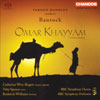Bantock Omar Khayyám
Riches from the Edwardian age superbly realised by Handley and his forces
View record and artist detailsRecord and Artist Details
Composer or Director: Granville Bantock
Genre:
Vocal
Label: Chandos
Magazine Review Date: 11/2007
Media Format: Super Audio CD
Media Runtime: 172
Mastering:
Stereo
DDD
Catalogue Number: CHSA5051

Tracks:
| Composition | Artist Credit |
|---|---|
| Omar Khayyám |
Granville Bantock, Composer
BBC Symphony Chorus BBC Symphony Orchestra Catherine Wyn-Rogers, Mezzo soprano Edward Price, Bass Granville Bantock, Composer Olivia Robinson, Soprano Roderick Williams, Baritone Siân Menna, Mezzo soprano Toby Spence, Tenor Vernon Handley, Conductor |
Author: Mike Ashman
Granville Bantock is the kind of British late-Romantic that Europeans from Herbert von Karajan to present-day casting directors have always warned us not to overrate. The London-born composer used his early championship of contemporaries – Strauss, Debussy and especially Sibelius, who became a close friend and correspondent – to enrich his own Wagner-nourished sonorities and dramatic ambitions. Because he was British, he fought shy of opera, channelling his gift for theatre into song-cycles (he wrote 40), symphonic tone-poems (he once planned a 24-work cycle), forward-looking multi-media events (Apollo and the Seaman for film projection and orchestra) and oratorios (a 700-page score of Christus).
Writing in the age of Mahler’s Eighth and Elgar’s three major oratorios, Bantock found 101 quatrains of 12th-century Persian philosophical poetry – in the then widely read (and very free) rendering of Pre-Raphaelite poet Edward Fitzgerald – an irresistible challenge. He set Fitzgerald’s work by feeding his natural gift for effective scoring and mood illustration with his own first-hand impressions of the Middle East (anticipating and sourcing any number of future film scores). It is to his credit that, throughout the nearly three-hour performance span, genuine symphonic interest rarely flags. His large orchestra calls for two complete, antiphonally placed, string sections, as well as the extra wind and brass that his European heroes were deploying. The choral part becomes virtuoso in its frequent use of unaccompanied, tricky-to-pitch passages, while three named soloists, the Beloved (mezzo), the Poet (tenor) and the Philosopher (baritone) are continually “onstage” in roles of operatic length.
This first recording reflects the detail and passion of Vernon Handley’s championing of Bantock’s kaleidoscopic output, and Stephen Jackson ensures that the choral input is similarly lively and fresh. Toby Spence brings a bright mix of Italianate slancio and English declamation to the Poet, combining well with Catherine Wyn-Rogers’s more controlled reading of the Beloved in substantial (and Parsifal-like) duets in Parts 1 (disc 1, tr 9) and 3 (disc 3, tr 11, a highlight and a good starting-point for samplers). Chandos’s sound is suitably lush, occasionally at the expense of the chorus’s diction. It’s what recordings should be for, and should encourage future festival performances.
Writing in the age of Mahler’s Eighth and Elgar’s three major oratorios, Bantock found 101 quatrains of 12th-century Persian philosophical poetry – in the then widely read (and very free) rendering of Pre-Raphaelite poet Edward Fitzgerald – an irresistible challenge. He set Fitzgerald’s work by feeding his natural gift for effective scoring and mood illustration with his own first-hand impressions of the Middle East (anticipating and sourcing any number of future film scores). It is to his credit that, throughout the nearly three-hour performance span, genuine symphonic interest rarely flags. His large orchestra calls for two complete, antiphonally placed, string sections, as well as the extra wind and brass that his European heroes were deploying. The choral part becomes virtuoso in its frequent use of unaccompanied, tricky-to-pitch passages, while three named soloists, the Beloved (mezzo), the Poet (tenor) and the Philosopher (baritone) are continually “onstage” in roles of operatic length.
This first recording reflects the detail and passion of Vernon Handley’s championing of Bantock’s kaleidoscopic output, and Stephen Jackson ensures that the choral input is similarly lively and fresh. Toby Spence brings a bright mix of Italianate slancio and English declamation to the Poet, combining well with Catherine Wyn-Rogers’s more controlled reading of the Beloved in substantial (and Parsifal-like) duets in Parts 1 (disc 1, tr 9) and 3 (disc 3, tr 11, a highlight and a good starting-point for samplers). Chandos’s sound is suitably lush, occasionally at the expense of the chorus’s diction. It’s what recordings should be for, and should encourage future festival performances.
Discover the world's largest classical music catalogue with Presto Music.

Gramophone Digital Club
- Digital Edition
- Digital Archive
- Reviews Database
- Full website access
From £8.75 / month
Subscribe
Gramophone Full Club
- Print Edition
- Digital Edition
- Digital Archive
- Reviews Database
- Full website access
From £11.00 / month
Subscribe
If you are a library, university or other organisation that would be interested in an institutional subscription to Gramophone please click here for further information.




